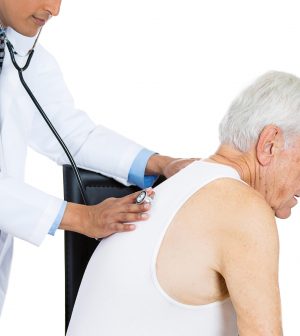- The Long-Term Effects of Daily Turmeric Supplements on Liver Health
- Could Your Grocery Store Meat Be Causing Recurring UTIs?
- Are You Making This Expensive Thermostat Error This Winter?
- Recognizing the Signs of Hypothyroidism
- 10 Strategies to Overcome Insomnia
- Could Artificial Sweeteners Be Aging the Brain Faster?
- Techniques for Soothing Your Nervous System
- Does the Water in Your House Smell Funny? Here’s Why
- Can a Daily Dose of Apple Cider Vinegar Actually Aid Weight Loss?
- 6 Health Beverages That Can Actually Spike Your Blood Sugar
Surgery Brings Added Risks to People With COPD

Major surgery is a challenge for people with chronic obstructive pulmonary disease (COPD), raising their odds of death within a year by 61%, new research shows.
The researchers also found these patients incurred 13% higher health care costs in the year after their operation, compared to patients without the respiratory condition.
“These increased risks and costs were evident long after the immediate 30-day postoperative period,” said lead researcher Dr. Ashwin Sankar, a clinician investigator in anesthesiology at the University of Toronto, in Canada.
The study quantifies the additional risks COPD patients face, which doctors should discuss before surgery, he said.
“Informing patients of the risk of surgery is an important component of the informed-consent process prior to surgery. We suggest that clinicians and patients weigh these risks when deciding to proceed with surgery,” Sankar explained.
This study can’t prove that COPD caused the deaths after surgery as most of the COPD patients had other chronic health conditions, which could have contributed to the outcomes.
“What we suggest to clinicians is to use COPD as a flag for other conditions, and to ensure that modifiable risk factors are optimized prior to surgery,” Sankar said.
Also, because patients with COPD are at risk beyond 30 days after surgery, it may be worthwhile to support these patients’ recovery beyond the first month after surgery, he added.
In the United States, about 16 million people have COPD, according to the U.S. Centers for Disease Control and Prevention. COPD includes a group of diseases, emphysema and chronic bronchitis among them, that block airflow and restrict breathing.
For the study, Sankar and his colleagues collected data on nearly 933,000 patients who had major surgery, including total hip or knee replacement, gastrointestinal surgery, vascular surgery or other elective operations. More than 170,000 of these patients suffered from COPD.
The COPD patients were older, more likely to be male, frail, have lower income and have pre-existing conditions, such as heart disease, diabetes and lung cancer, the researchers noted.
Dr. Mangala Narasimhan is senior vice president of critical care services at Northwell Health in New Hyde Park, N.Y. “It does make sense that after surgery these patients would have more complications,” she said.
“The advice to physicians is to consider the need for surgery and to counsel patients that there is more risk of complications, and that patients at least know that going into it so they can make informed decisions,” she added.
Narasimhan’s advice to anyone with COPD is, number one, do not smoke. “Smoking leads to increased risks of a lot of other things in the future,” she said. “If you are smoking, quit as soon as you possibly can. Even if you quit later in life, there is definitely some benefit.”
Also, she said that patients should consider whether surgery is necessary.
“No surgery is without its risk,” Narasimhan said. “For these patients, it’s significantly riskier and they should consider that before jumping into a procedure.” Of course, some surgeries can’t be avoided, she acknowledged.
If you must have major surgery, Narasimhan advises getting any health issues under control beforehand. This includes COPD, diabetes, lung cancer or heart disease.
“The one piece of advice is not to ignore the underlying risks. They will catch up with you, so optimize your medical condition prior to going into surgery,” she said.
Narasimhan said your doctor may even withhold surgery until your health is the best it can be.
The report was published Jan. 17 in the CMAJ (Canadian Medical Association Journal)Canadian Medical Association Journal).
More information
For more on COPD, head to the U.S. Centers for Disease Control and Prevention.
SOURCES: Ashwin Sankar, MD, clinician investigator, anesthesiology, University of Toronto, Canada; Mangala Narasimhan, DO, senior vice president, critical care services, Northwell Health, New Hyde Park, N.Y.; CMAJ (Canadian Medical Association Journal), Jan. 17, 2023
Source: HealthDay
Copyright © 2026 HealthDay. All rights reserved.










